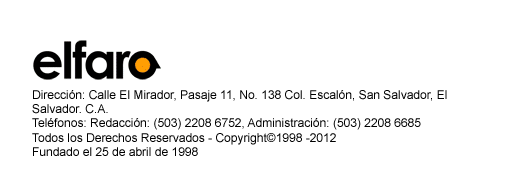OIG INSPECTION OF EMBASSY SAN SALVADOR - AMBASSADOR'S POST MEMORANDUM - INTRIGUING OPPORTUNITIES AND SERIOUS CHALLENGES
Publicado el 24 de Mayo de 2011
id: 47786
date: 12/15/2005 15:28
refid: 05SANSALVADOR3485
origin: Embassy San Salvador
classification: SECRET
destination: 05STATE210813
header:
This record is a partial extract of the original cable. The full text of the original cable is not available.
----------------- header ends ----------------
S E C R E T SECTION 01 OF 03 SAN SALVADOR 003485
SIPDIS
FOR OIG FROM AMBASSADOR BARCLAY
E.O. 12958: DECL: 12/15/2015
TAGS: AMGT, ASIG, BBG
SUBJECT: OIG INSPECTION OF EMBASSY SAN SALVADOR - AMBASSADOR'S POST MEMORANDUM - INTRIGUING OPPORTUNITIES AND SERIOUS CHALLENGES
REF: STATE 210813
Classified By: AMBASSADOR H. DOUGLAS BARCLAY FOR REASONS 1.4 (B) AND
(D)
(C) Our relationship with El Salvador offers Embassy San
Salvador both intriguing opportunities and serious
challenges. During the 1980s, El Salvador suffered the most
devastating internal conflict in all of Central America;
fourteen years after the peace accords, it is the most
politically stable country in the region. Its people are
famously industrious, yet the country is critically poor.
The government?s economic policy is largely on the right
road; yet El Salvador still lacks the institutional bases
necessary for a strong and stable economy. The nation?s
leadership is capable, but its ranks are thin. Although the
center-right has gradually democratized, the left is still
dominated by its hard-line, orthodox element. The
development of a democratic left ? capable of governing and
willing to depart office following an electoral defeat ? is
an important medium-term goal for the mission.
(C) President Tony Saca?s ARENA government, elected in 2004,
is an unabashedly pro-American administration in a rough
neighborhood. The GOES has sent five rotations of troops to
Iraq ? it is the only Latin American force still present --
has been a vocal supporter of the Free Trade Area of the
Americas. El Salvador will benefit from the entry-into-force
of the Central American Free Trade Agreement (CAFTA) in early
2006; although most attention has focused on increased trade
with the US, El Salvador will also benefit both from the
reduction of tariff barriers among Central American nations
as well as from the series of reforms required for CAFTA
certification. El Salvador has also qualified to compete
with two other lower-middle-income countries for Millennium
Challenge Account Funds. I expect the Millennium Challenge
Corporation to choose El Salvador?s project, which focuses
on developing the country?s poor, northern region, for
funding sometime in mid-2006.
Mission Goals
(U) Our principal challenges into five broad groups. Our FY
2008 MPP, which will be submitted just prior to the
inspection team?s arrival at post, will address these in
considerably greater detail.
(U) Economic: We want to create a diversifying private
sector-led economy that grows by approximately four percent
per year; to address bottlenecks that constrain domestic and
international investment; and to promote further market
opening and regional integration, as well as increased
exports of US goods and services. We have worked with the
Salvadoran Government toward the early, effective
implementation of CAFTA-DR, which will be one of the most
important pro-growth developments for El Salvador into the
medium term future. CAFTA will help El Salvador increase its
national competitiveness, institute more transparent business
practices and better government services for local and
foreign investors, and maintain momentum on economic reform
and integration. USDA-funded programs continue to support
agricultural diversification and non-traditional exports,
reflected in agricultural sector growth rates that have
reached 5%. Strong Embassy support for El Salvador?s
interest in the Millennium Challenge Account has resulted in
GOES measures to reduce the costs of doing business and the
corruption that undermines economic growth.
(U) Homeland Security: We need to stem the flow of illegal
Salvadoran aliens to the United States; increase deportations
those detained in the US; and strengthen El Salvador?s
capacity to control its borders. We provide training and
equipment to immigration officials to ensure that they can
identify fraudulent passports and visas. We are working
closely with DHS and the GOES to establish an agreement on
expediting the deportations of Salvadorans detained on
immigration charges in the United States. We also offer
extensive training and equipment to the border police in
furtherance of their efforts against human smuggling and
trafficking.
(U) Democracy and Human Rights: We are working with
Salvadoran officials in improving public institutions;
seeking to increase the average citizen?s participation in
politics and community civic activities; addressing the
capability of the armed forces to operate in support of
peacekeeping, counter-terrorism, humanitarian/disaster relief
and counter-drug operations; and encouraging development of a
national security strategy that emphasizes military
subordination to civil authorities.
(U) Law Enforcement: We will seek to strengthen the rule of
law through reform of the justice system and modernization of
laws and institutions while utilizing and improving
international mechanisms for regional cooperation against
crime. We have initiated a program to pair Spanish-speaking,
U.S. federal judges with Salvadoran judges for the purpose of
exchanging information and offering advice. USAID is working
closely with Salvadoran counterparts to reform the legal
system. The International Law Enforcement Academy, which was
recently approved by the Salvadoran Legislature, will bring
police officers and prosecutors from all over the western
hemisphere to El Salvador to receive high-caliber training
and to foster regional cooperation on law enforcement issues.
(U) Administrative Services: We will take advantage of
collocation of USAID within the mission compound to carry out
a model consolidation of State-USAID administrative
resources. This process has not yet begun, in part due to
skepticism on the part of USAID. However, our FY 2008 MPP
submission will press this matter, with performance
indicators reflecting a) study of overlap and decisions on
how to resolve it, and b) actual implementation of the
decision.
-
Migration Issues the Biggest Headache
(C) Of these, the border issue is likely to be the greatest
political challenge. The United States is an enormous
attraction to Salvadorans of all ages, but especially to the
young. One recent survey showed that seventy percent of
Salvadorans would immigrate to the US if possible. The GOES
suggests that up to two million Salvadoran citizens currently
live in the US. Bands of immigrant smugglers, popularly
known as ?coyotes,? find illegal immigration to be a
profitable undertaking, and have achieved folk hero status in
parts of the country. Salvadorans resident in the US sent
approximately $3 billion in remittances to El Salvador during
calendar year 2005, seventy percent of El Salvador?s foreign
exchange as well as a sum that provided a life-line to many
Salvadorans, particularly in small towns and rural areas.
Extension of temporary protected status for several hundred
thousand qualified Salvadorans currently in the US is a major
priority for Saca?s government. The GOES has, however,
cooperated with US efforts to pursue the Border Security
Initiative (BSI), participating actively in a bilateral
working group (chaired by the Deputy Minister of Governance
and the Embassy?s Political Counselor) seeking to work
through the issues involved. Our efforts to pursue the BSI
will have indirect costs for the US; much of El Salvador?s
pro-Americanism is based on family ties with Salvadorans
living (legally and illegally) in the US, as well as on the
typical Salvadoran?s moving adherence to the American dream.
(C) Addressing deficiencies in El Salvador?s legal and law
enforcement systems will also be a major challenge. The
creation of the National Civilian Police (PNC) following the
end of the civil war has been a model for the region.
Nonetheless, the police force is underfunded, and struggling
without success against steadily increasing criminality.
Street crime and extortion is of increasing concern here.
Salvadoran gang crime is a threat both here and in the US;
issues surrounding the deportation of gang members illegally
in the US form an important concern within our bilateral
relationship. The criminal and civil justice system is slow,
cumbersome and unpredictable. A perceived lack of judicial
security could prove an important disincentive to foreign
investment here.
-
High Embassy Morale
(U) Embassy morale is high, although the fact that El
Salvador is a critical crime-threat post is a concern.
Approximately five hundred employees (including security
contractors) work on our twenty-six acre embassy campus.
Housing is good, and schools adequate. We have an active and
effective CLO office. Entry-level officers play an
important role in the Embassy?s operations and social-life;
they enjoy a model mentoring program that couples ELOs with
experienced mid-level officers in their cone. I am proud
that San Salvador is considered a very family-friendly post.
We have an experienced and capable Management section. I am
particularly proud of our Consular section, which is known
throughout the Department for its originality and
professionalism.
-
Interagency Challenges
(S/NF) Sixteen agencies are represented at our mission, and
we are likely to add one other (the Millennium Challenge
Corporation) sometime next year. Relations among the
mission's sections are cordial and good, but coordination of
our work (especially among the many agencies with
law-enforcement responsibilities) requires considerable
front-office attention. The reestablishment of San
Salvador?s CIA station as a country-specific (rather than a
regional) station will help reinforce collection of
intelligence specifically related to Salvadoran domestic
politics and foreign policy, which I have found
disappointing. The creation of a permanent Legal Attach ,s
office (following coverage by TDY personnel from the FBI)
will reinforce cooperation with Salvadoran officials on
international crime, particularly that related to gangs. So
will the permanent establishment of the International Law
Enforcement Academy (ILEA) San Salvador, which will bring law
enforcement personnel (police, prosecutors and judges) from
throughout Latin America to El Salvador for training. I look
forward to talking to you about State-USAID consolidation
issues.
(U) One OIG recommendation remains unresolved from the last
inspection. We have repeatedly sought to obtain funding that
would allow us to expand Consular Section space. We will be
pleased to discuss our options for addressing this problem,
and will ask for your support in resolving it.
-
Welcome to San Salvador
(U) I think you will agree that we have a great team, across
the board, here in Embassy San Salvador. I look forward to
seeing you early next year.
Barclay
=======================CABLE ENDS============================




